- Home
- Julian Barnes
The Sense of an Ending Page 4
The Sense of an Ending Read online
Page 4
After we broke up, she slept with me.
Yes, I know. I expect you’re thinking: The poor sap, how did he not see that coming? But I didn’t. I thought we were over, and I thought there was another girl (a normal-sized girl who wore high heels to parties) I was interested in. I didn’t see it coming at any point: when Veronica and I bumped into each other at the pub (she didn’t like pubs), when she asked me to walk her home, when she stopped halfway there and we kissed, when we got to her room and I turned the light on and she turned it off again, when she took her knickers off and passed me a pack of Durex Fetherlite, or even when she took one from my fumbling hand and put it on me, or during the rest of the swift business.
Yes, you can say it again: You poor sap. And did you still think her a virgin when she was rolling a condom on to your cock? In a strange way, you know, I did. I thought it might be one of those intuitive female skills I inevitably lacked. Well, perhaps it was.
‘You’ve got to hold on to it as you pull out,’ she whispered (did she think I was a virgin, perhaps?). Then I got up and walked to the bathroom, the filled condom occasionally slapping against the inside of my thighs. As I disposed of it I came to a decision and a conclusion: No, it went, no.
‘You selfish bastard,’ she said, the next time we met.
‘Yes, well, there it is.’
‘That practically makes it rape.’
‘I don’t think anything at all makes it that.’
‘Well, you might have had the decency to tell me beforehand.’
‘I didn’t know beforehand.’
‘Oh, so it was that bad?’
‘No, it was good. It’s just …’
‘Just what?’
‘You were always asking me to think about our relationship and so now perhaps I have. I did.’
‘Bravo. It must have been hard.’
I thought: And I haven’t even seen her breasts, in all this time. Felt them, but not seen them. Also, she’s completely wrong about Dvořák and Tchaikovsky. What’s more, I’ll be able to play my LP of Un Homme et Une Femme as often as I like. Openly.
‘Sorry?’
‘Jesus, Tony, you can’t even concentrate now. My brother was right about you.’
I knew I was meant to ask what Brother Jack had said, but I didn’t want to give her the pleasure. As I remained silent, she went on,
‘And don’t say that thing.’
Life seemed even more of a guessing game than usual.
‘What thing?’
‘About us still being able to be friends.’
‘Is that what I’m meant to say?’
‘You’re meant to say what you think, what you feel, for Christ’s sake, what you mean.’
‘All right. In that case I won’t say it – what I’m meant to say. Because I don’t think we can still be friends.’
‘Well done,’ she said sarcastically. ‘Well done.’
‘But let me ask you a question then. Did you sleep with me to get me back?’
‘I don’t have to answer your questions any more.’
‘In which case, why wouldn’t you sleep with me when we were going out together?’
No answer.
‘Because you didn’t need to?’
‘Perhaps I didn’t want to.’
‘Perhaps you didn’t want to because you didn’t need to.’
‘Well, you can believe what it suits you to believe.’
The next day, I took a milk jug she’d given me down to the Oxfam shop. I hoped she’d see it in the window. But when I stopped to check, there was something else on show instead: a small coloured lithograph of Chislehurst I’d given her for Christmas.
At least we were studying different subjects, and Bristol was a large enough city for us only occasionally to half-run into one another. The times we did, I would be hit by a sense of what I can only call pre-guilt: the expectation that she was going to say or do something that would make me feel properly guilty. But she never deigned to speak to me, so this apprehension gradually wore off. And I told myself I didn’t have anything to feel guilty about: we were both near-adults, responsible for our own actions, who had freely entered into a relationship which hadn’t worked out. No one had got pregnant, no one had got killed.
In the second week of the summer vacation a letter arrived with a Chislehurst postmark. I inspected the unfamiliar handwriting – looping and slightly careless – on the envelope. A female hand: her mother, no doubt. Another burst of pre-guilt: perhaps Veronica had suffered a nervous collapse, become wasted and even more waiflike. Or perhaps she had peritonitis and was asking for me from her hospital bed. Or perhaps … but even I could tell these were self-important fantasies. The letter was indeed from Veronica’s mother; it was brief and, to my surprise, not in the least accusatory. She was sorry to hear we had broken up, and sure I would find someone more suitable. But she didn’t appear to mean this in the sense that I was a scoundrel who deserved someone of equally low moral character. Rather, she implied the opposite: that I was well out of things, and she hoped the best for me. I wish I’d kept that letter, because it would have been proof, corroboration. Instead, the only evidence comes from my memory – of a carefree, rather dashing woman who broke an egg, cooked me another, and told me not to take any shit from her daughter.
I went back to Bristol for my final year. The girl of normal height who wore heels was less interested than I’d imagined, and so I concentrated on work. I doubted I had the right kind of brain for a first, but was determined to get a 2:1. On Friday nights, I allowed myself the break of an evening at the pub. One time, a girl I’d been chatting to came back with me and stayed the night. It was all pleasantly exciting and effective, but neither of us contacted the other afterwards. I thought about this less at the time than I do now. I expect such recreational behaviour will strike later generations as quite unremarkable, both for nowadays and for back then: after all, wasn’t ‘back then’ the Sixties? Yes it was, but as I said, it depended on where – and who – you were. If you’ll excuse a brief history lesson: most people didn’t experience ‘the Sixties’ until the Seventies. Which meant, logically, that most people in the Sixties were still experiencing the Fifties – or, in my case, bits of both decades side by side. Which made things rather confusing.
Logic: yes, where is logic? Where is it, for instance, in the next moment of my story? About halfway through my final year, I got a letter from Adrian. This had become an increasingly rare occurrence, as both of us were working hard for finals. He was of course expected to get a first. And then what? Postgraduate work, presumably, followed by academe, or some job in the public sphere where his brain and sense of responsibility would be put to good use. Someone once told me that the civil service (or at least, its higher echelons) was a fascinating place to work because you were always having to make moral decisions. Perhaps that would have suited Adrian. I certainly didn’t see him as a worldly person, or an adventurous one – except intellectually, of course. He wasn’t the sort who would get his name or face into the newspapers.
You can probably guess that I’m putting off telling you the next bit. All right: Adrian said he was writing to ask my permission to go out with Veronica.
Yes, why her, and why then; furthermore, why ask? Actually, to be true to my own memory, as far as that’s ever possible (and I didn’t keep this letter either), what he said was that he and Veronica were already going out together, a state of affairs that would doubtless come to my attention sooner or later; and so it seemed better that I heard about it from him. Also, that while this news might come as a surprise, he hoped that I could understand and accept it, because if I couldn’t, then he owed it to our friendship to reconsider his actions and decisions. And finally, that Veronica had agreed he should write this letter – indeed, it had been partly her suggestion.
As you can imagine, I enjoyed the bit about his moral scruples – implying that if I thought some venerable code of chivalry or, better still, some modern principle of e
thics had been infringed, then he would, naturally and logically, stop fucking her. Assuming that she wasn’t stringing him along as she had done me. I also liked the hypocrisy of a letter whose point was not just to tell me something I might not have found out anyway (or not for quite a while), but to let me know how she, Veronica, had traded up: to my cleverest friend, and, what’s more, a Cambridge chap like Brother Jack. Also, to warn me that she would be hanging around if I planned on seeing Adrian – which had the desired effect of making me plan not to see Adrian. Pretty good for a day’s work, or a night’s. Again, I must stress that this is my reading now of what happened then. Or rather, my memory now of my reading then of what was happening at the time.
*
But I think I have an instinct for survival, for self-preservation. Perhaps this is what Veronica called cowardice and I called being peaceable. Anyway, something warned me not to get involved – at least, not now. I took the nearest postcard to hand – one of the Clifton Suspension Bridge – and wrote words like: ‘Being in receipt of your epistle of the 21st, the undersigned begs to present his compliments and wishes to record that everything is jolly fine by me, old bean.’ Silly, but unambiguous; and it would do for the moment. I would pretend – especially to myself – that I didn’t mind in the slightest. I would study hard, put my emotions on hold, not take anyone home from the pub, masturbate as and when required, and make sure I got the degree I deserved. I did all that (and yes, I got a 2:1).
I stayed on for a few weeks after finishing my exams, fell in with a different group, drank systematically, smoked a bit of dope, and thought about very little. Apart from imagining what Veronica might have said to Adrian about me (‘He took my virginity and then immediately dumped me. So really, the whole thing felt like rape, do you see?’). I imagined her buttering him up – I’d witnessed the start of that – and flattering him, playing on his expectations. As I said, Adrian was not a worldly person, for all his academic success. Hence the priggish tone of his letter, which for a while I used to reread with self-pitying frequency. When, at last, I replied to it properly, I didn’t use any of that silly ‘epistle’ language. As far as I remember, I told him pretty much what I thought of their joint moral scruples. I also advised him to be prudent, because in my opinion Veronica had suffered damage a long way back. Then I wished him good luck, burnt his letter in an empty grate (melodramatic, I agree, but I plead youth as a mitigating circumstance), and decided that the two of them were now out of my life for ever.
What did I mean by ‘damage’? It was only a guess; I didn’t have any real evidence. But whenever I looked back on that unhappy weekend, I realised that it hadn’t been just a matter of a rather naïve young man finding himself ill at ease among a posher and more socially skilled family. That was going on too, of course. But I could sense a complicity between Veronica and her heavy-footed, heavy-handed father, who treated me as substandard. Also between Veronica and Brother Jack, whose life and deportment she clearly regarded as nonpareil: he was the appointed judge when she asked publicly of me – and the question gets more condescending with each repetition – ‘He’ll do, won’t he?’ On the other hand, I saw no complicity at all with her mother, who doubtless recognised her for what she was. How did Mrs Ford have the initial chance to warn me against her daughter? Because that morning – the first morning after my arrival – Veronica had told everyone I wanted a lie-in, and gone off with her father and brother. No such exchange between us justified that invention. I never had lie-ins. I don’t even have them now.
When I wrote to Adrian, I wasn’t at all clear myself what I meant by ‘damage’. And most of a lifetime later, I am only slightly clearer. My mother-in-law (who happily is not part of this story) didn’t think much of me but was at least candid about it, as she was about most things. She once observed – when there was yet another case of child abuse filling the papers and television news reports – ‘I reckon we were all abused.’ Am I suggesting that Veronica was the victim of what they nowadays call ‘inappropriate behaviour’: beery leering from her father at bathtime or bedtime, something more than a sibling cuddle with her brother? How could I know? Was there some primal moment of loss, some withdrawal of love when it was most needed, some overheard exchange from which the child concluded that …? Again, I cannot know. I have no evidence, anecdotal or documentary. But I remember what Old Joe Hunt said when arguing with Adrian: that mental states can be inferred from actions. That’s in history – Henry VIII and all that. Whereas in the private life, I think the converse is true: that you can infer past actions from current mental states.
I certainly believe we all suffer damage, one way or another. How could we not, except in a world of perfect parents, siblings, neighbours, companions? And then there is the question, on which so much depends, of how we react to the damage: whether we admit it or repress it, and how this affects our dealings with others. Some admit the damage, and try to mitigate it; some spend their lives trying to help others who are damaged; and then there are those whose main concern is to avoid further damage to themselves, at whatever cost. And those are the ones who are ruthless, and the ones to be careful of.
You might think this is rubbish – preachy, self-justificatory rubbish. You might think that I behaved towards Veronica like a typically callow male, and that all my ‘conclusions’ are reversible. For instance, ‘After we broke up, she slept with me’ flips easily into ‘After she slept with me, I broke up with her.’ You might also decide that the Fords were a normal middle-class English family on whom I was chippily foisting bogus theories of damage; and that Mrs Ford, instead of being tactfully concerned on my behalf, was displaying an indecent jealousy of her own daughter. You might even ask me to apply my ‘theory’ to myself and explain what damage I had suffered a long way back and what its consequences might be: for instance, how it might affect my reliability and truthfulness. I’m not sure I could answer this, to be honest.
I didn’t expect any reply from Adrian, nor did I get one. And now the prospect of seeing Colin and Alex by themselves became less appealing. Having been three, then four, how was it possible to go back to being three again? If the others wanted to make up their own party, fine, go ahead. I needed to get on with my life. So I did.
Some of my contemporaries did VSO, departing to Africa, where they taught schoolkids and built mud walls; I wasn’t so high-minded. Also, back then you somehow assumed that a decent degree would ensure a decent job, sooner or later. ‘Ti-yi-yi-yime is on my side, yes it is,’ I used to yodel, duetting with Mick Jagger as I gyrated alone in my student room. So, leaving others to train as doctors and lawyers and sit the civil-service exams, I took myself off to the States and roamed around for six months. I waited on tables, painted fences, did gardening, and delivered cars across several states. In those years before mobile phones, email and Skype, travellers depended on the rudimentary communications system known as the postcard. Other methods – the long-distance phone call, the telegram – were marked ‘For Emergency Use Only’. So my parents waved me off into the unknown, and their news bulletins about me would have been restricted to ‘Yes, he’s arrived safely’, and ‘Last time we heard he was in Oregon’, and ‘We expect him back in a few weeks’. I’m not saying this was necessarily better, let alone more character-forming; just that in my case it probably helped not to have my parents a button’s touch away, spilling out anxieties and long-range weather forecasts, warning me against floods, epidemics and psychos who preyed on backpackers.
I met a girl while I was out there: Annie. She was American, travelling round like me. We hooked up, as she put it, and spent three months together. She wore plaid shirts, had grey-green eyes and a friendly manner; we became lovers easily and quickly; I couldn’t believe my luck. Nor could I believe how simple it was: to be friends and bed-companions, to laugh and drink and smoke a little dope together, to see a bit of the world side by side – and then to separate without recrimination or blame. Easy come, easy go, she said, and meant it. Later
, looking back, I wondered if something in me wasn’t shocked by this very easiness, and didn’t require more complication as proof of … what? Depth, seriousness? Although, God knows you can have complication and difficulty without any compensating depth or seriousness. Much later, I also found myself debating whether ‘Easy come, easy go’ wasn’t a way of asking a question, and looking for a particular answer I wasn’t able to supply. Still, that’s all by the by. Annie was part of my story, but not of this story.
My parents thought of getting in touch when it happened, but had no idea where I was. In a true emergency – presence required at a mother’s deathbed – I imagine the Foreign Office would have contacted the Embassy in Washington, who would have informed the American authorities, who would have asked police forces across the country to look out for a cheerful, sunburnt Englishman who was a little more self-assured than he had been on his arrival in the country. Nowadays all it takes is a text message.

 The Sense of an Ending
The Sense of an Ending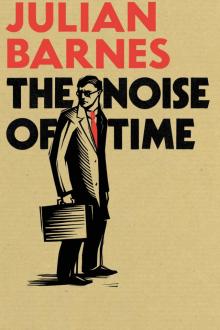 The Noise of Time
The Noise of Time Metroland
Metroland Letters From London
Letters From London Before She Met Me
Before She Met Me Pulse
Pulse Flaubert's Parrot
Flaubert's Parrot England, England
England, England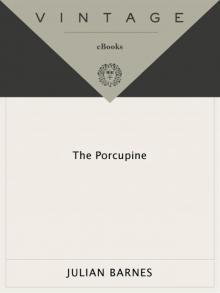 The Porcupine
The Porcupine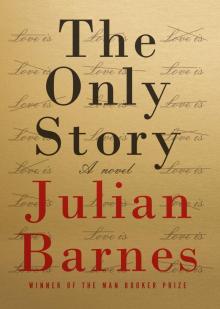 The Only Story
The Only Story Love, Etc
Love, Etc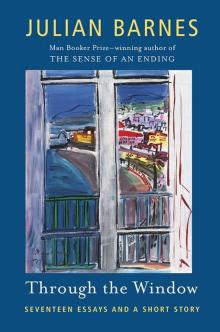 Through the Window: Seventeen Essays and a Short Story
Through the Window: Seventeen Essays and a Short Story Staring at the Sun
Staring at the Sun Cross Channel
Cross Channel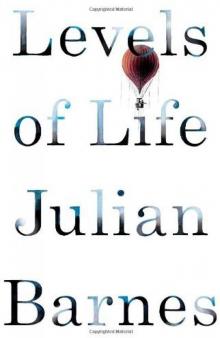 Levels of Life
Levels of Life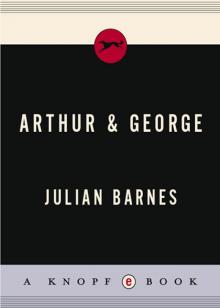 Arthur & George
Arthur & George Love, Etc.
Love, Etc.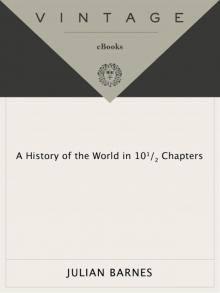 A History of the World in 10 1/2 Chapters
A History of the World in 10 1/2 Chapters Something to Declare
Something to Declare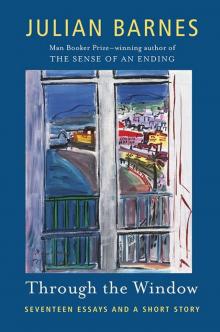 Through the Window: Seventeen Essays and a Short Story (Vintage International)
Through the Window: Seventeen Essays and a Short Story (Vintage International)